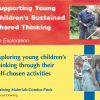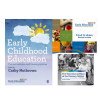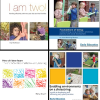Helping children with their behaviour
Children learn how to behave All children are individuals, because they are born with their own character. This is why even children within the same
On this page we will collate information we find about Adverse Childhood Experiences (ACEs), a relatively new scientific concept impacting early childhood and our work. The more we find out about ACEs, the more we can apply it in our practice.
The science is clear, early adversity dramatically affects health across a lifetime…The single most important thing we need today is the courage to look this problem in the face and say this is real and this is all of us. (Dr Nadine Burke Harris)
This is vital information for every leader and every setting and school in terms of applying the knowledge to support and inform practice and understanding of attachment, trauma and stress and how adverse experiences in childhood can affect behaviour, brain development, stress, mental health and physical health.
Supporting the attachment needs of young children in whatever ways we can is imperative in our areas of work.
There are 10 types of childhood trauma measured in the ACE Study. Five are personal — physical abuse, verbal abuse, sexual abuse, physical neglect, and emotional neglect. Five are related to other family members: a parent who’s an alcoholic, a mother who’s a victim of domestic violence, a family member in jail, a family member diagnosed with a mental illness, and the disappearance of a parent through divorce, death or abandonment. Each type of trauma counts as one. (Taken from ACEs too high website – see link below)
ACEs are stressful events occurring during childhood that directly affect a child (e.g. child maltreatment) or affect the environment in which they live (e.g. growing up in a house where there is domestic violence)
Children learn how to behave All children are individuals, because they are born with their own character. This is why even children within the same
Early childhood seems like a time of constant change to adults. Just as you’ve got used to a predictable daytime nap, your child decides that
Healthy settling for high wellbeing How can we best help children feel at ease so that they are secure and settled in their new provision?
Having a voice There may be many reasons why young children do not have a voice. Perhaps they There could be many more reasons. Loss
This page was written following our Community of practice about transitions. We had a lot of sharing and questioning about this and so we thought we
Here is a list of books and resources compiled by Anni McTavish to support feelings and behaviour. Reference books Why Love Matters – how affection
When children cry they are telling us something important We need to understand and listen to their tears. Supporting children when they express strong emotions
Animals are special and important to many young children. In fact, even if they do not share their home with a pet, they will meet
As schools and settings open up fully once more to all children after yet another long lockdown, now is a really important time for practitioners
by Cathy Gunning Showing empathy creates calm Showing and demonstrating empathy to children who have experienced trauma and have attachment difficulties, can help them to
There is no doubt about it, settling takes time for many children. For others it would appear it takes no time at all. If we






Early Education
2 Victoria Square
St Albans
AL1 3TF
T: 01727 884925
E: office@early-education.org.uk